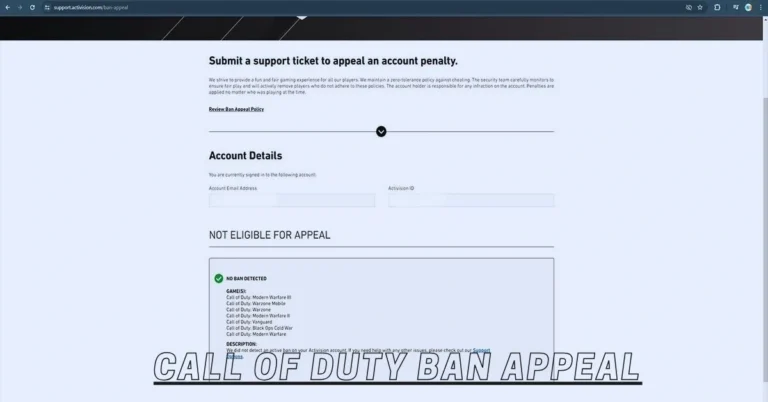Introduction
In the world of competitive gaming, maintaining the integrity of the gaming environment is crucial for fair play and enjoyment. Call of Duty, a popular first-person shooter series developed by Infinity Ward and Treyarch, has a strict policy against cheating and misconduct. Players who violate these policies may face bans from the game. However, if a player believes their ban was unjust, they have the option to file a Call of Duty ban appeal. This comprehensive guide will explore the process of appealing a Call of Duty ban, providing detailed information on each step, common reasons for bans, and tips for a successful appeal.
Understanding Call of Duty’s Ban System
Types of Bans
Call of Duty employs several types of bans to address various infractions. These can range from temporary suspensions to permanent bans, depending on the severity of the offense. Temporary bans typically last from a few days to several weeks, while permanent bans are more severe and often result from repeated or egregious violations.
Common Reasons for Bans
Bans in Call of Duty can result from various actions, including cheating, exploiting glitches, inappropriate behavior, and violating the game’s terms of service. Cheating, such as using aim bots or wall hacks, is a primary reason for bans. Exploiting game glitches to gain an unfair advantage or engaging in toxic behavior, such as harassment or offensive language, can also lead to bans.
The Call of Duty Ban Appeal Process
Step 1: Reviewing the Ban Notification
When a player is banned, they receive a notification detailing the reason for the ban and its duration. It is crucial to carefully review this notification to understand the specific reasons for the ban and determine if it was justified or a mistake.
Step 2: Gathering Evidence
Before filing a Call of Duty ban appeal, players should gather any evidence that supports their case. This may include screenshots, videos, or detailed descriptions of the incident that led to the ban. Evidence is essential in proving that the ban was unwarranted or that there was a misunderstanding.
Step 3: Submitting the Appeal
To submit a Call of Duty ban appeal, players must contact Call of Duty’s support team through their official website or support portal. The appeal should include a clear explanation of why the ban is believed to be unjust, along with any supporting evidence. Providing a detailed and polite appeal increases the chances of a favorable review.
Step 4: Awaiting Response
After submitting a Call of Duty ban appeal, players must wait for a response from the support team. The review process can take several days or even weeks, depending on the volume of appeals and the complexity of the case. During this time, it is essential to remain patient and avoid creating additional support tickets or messages.
Step 5: Reviewing the Outcome
Once a decision is made regarding the Call of Duty ban appeal, players will receive a response. The outcome may result in the lifting of the ban, a reduction in the ban duration, or a confirmation of the original decision. If the appeal is unsuccessful, players should review the feedback provided and consider whether additional steps are necessary.
Common Issues and Tips for a Successful Call of Duty Ban Appeal
Providing Accurate Information
When appealing a ban, it is crucial to provide accurate and truthful information. Misleading or false statements can undermine the credibility of the Call of Duty ban appeal and reduce the chances of a successful outcome.
Being Respectful and Professional
Maintaining a respectful and professional tone in the appeal is essential. Avoiding aggressive language or personal attacks helps ensure that the support team reviews the appeal objectively and fairly.
Understanding the Rules
Familiarizing oneself with Call of Duty’s terms of service and rules can help players avoid future bans and strengthen their appeals. Understanding the specific guidelines can also assist in addressing any issues related to the ban.
Following Up
If there is no response within the expected timeframe, players may consider following up with a polite inquiry. However, excessive follow-ups or spamming the support team can be counterproductive.
What to Do If the Call of Duty Ban Appeal Is Denied
Reviewing the Denial
If a Call of Duty ban appeal is denied, players should carefully review the denial message to understand the reasons behind the decision. This information can be valuable for addressing any issues or improving future appeals.
Accepting the Decision
Sometimes, the support team’s decision may be final. In such cases, accepting the decision and focusing on improving behavior or gameplay can help avoid future issues.
Seeking Additional Help
If a player believes there has been an error or if they have additional information that was not included in the initial appeal, they may seek additional help from the support team. Providing new evidence or clarifying misunderstandings can sometimes lead to a reconsideration of the ban.
Preventing Future Bans
Adhering to the Rules
To avoid future bans, players should adhere to Call of Duty’s rules and guidelines. This includes avoiding cheating, exploiting glitches, and engaging in respectful behavior.
Reporting Issues
Players who encounter cheating or other rule violations should report these issues through the proper channels. Reporting helps maintain the integrity of the game and prevents unfair advantages.
Staying Informed
Keeping up-to-date with any changes to the game’s rules or policies can help players stay compliant and avoid inadvertent violations.
Conclusion
Appealing a Call of Duty ban requires a clear understanding of the ban system, a well-prepared appeal, and adherence to the game’s rules. By following the outlined steps and maintaining a respectful approach, players can effectively navigate the Call of Duty ban appeal process and work towards a resolution. Whether seeking to overturn an unjust ban or learning from the experience to prevent future issues, understanding the process and requirements is key to a successful appeal.
Read More: ssoap2day: A Comprehensive Analysis

